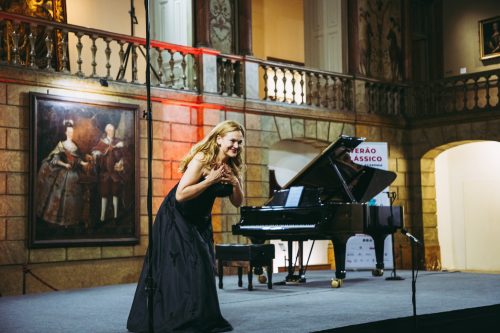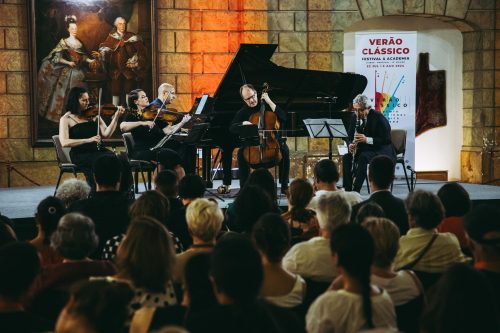 Portugal Verão Clássico Competition 2024 [3] – MasterFest Live performance III: Anna Samuil (soprano), Tedi Papavrami, Alissa Margulis (violins), Jennifer Stumm (viola), Giovanni Gnocchi (cello), Silvia Careddu (flute), Pascal Moraguès (clarinet), Filipe Pinto-Ribeiro, Matthias Samuil (piano). Museu Nacional dos Coches, Lisbon, 31.7.2024. (LV)
Portugal Verão Clássico Competition 2024 [3] – MasterFest Live performance III: Anna Samuil (soprano), Tedi Papavrami, Alissa Margulis (violins), Jennifer Stumm (viola), Giovanni Gnocchi (cello), Silvia Careddu (flute), Pascal Moraguès (clarinet), Filipe Pinto-Ribeiro, Matthias Samuil (piano). Museu Nacional dos Coches, Lisbon, 31.7.2024. (LV)

Mozart – Flute Quartet No.3 in C main, Ok.285b [listed in the program incorrectly as K.285a]; Violin Sonata No.21 in E minor, Ok.304; Serenade No.10 in B-flat main, Ok.361, ‘Gran Partita’ (primarily based on an association by Christian Friedrich Schwencke)
R. Strauss – ‘Allerseelen’, ‘Morgen’, ‘Cäcilie’
There was a phenomenal Mozartian symmetry to the Verão Clássico Competition’s third MasterFest live performance. It was deeply unhappy at instances, and foolish and joyous at others. At its coronary heart, Richard Strauss sounded radiant, consoling notes.
In Mozart’s Flute Quartet, Sylvia Careddu’s embouchure was impeccable, candy and fluent, to which Tedi Papavrami contributed bouncing bows and lyrical grace. And Giovanni Gnocchi in his huge, second motion solo, confirmed that it isn’t solely Haydn and Beethoven who loved outrageous rustic humor. Nonetheless, a extra lachrymose than standard air hung over the penultimate variation earlier than the cheerful ending.
When Papavrami returned with Filipe Pinto-Ribeiro to play one in every of Mozart’s saddest works, it was as if one other world was being explored. They performed the Violin Sonata in E minor that he wrote on the time his mom died. It was one in every of solely thrice Mozart wrote a rondo that resulted in a minor key; it was one thing he reserved for particular moments. Whereas Papavrami performed with an inward, intimate tone, Pinto-Ribeiro’s responses have been overtly charged with love, spun out into Mozartian house as if they’d by no means finish.
Three songs by Richard Strauss adopted, sung by Anna Samuil alongside her husband, pianist Matthias Samuil, and so they caught and remodeled the love and loss we felt for Mozart at that second. As she had opened her coronary heart to her college students throughout teaching, Samuil gave herself absolutely to the remembering. In ‘Cäcilie’, with Matthias taking part in poetically like her lover and only a lingering disappointment in her voice, she unfurled a radiant Straussian dawn.

The live performance ended with the identical Mozart curiosity that had ended my earlier keep on the Verão Clássico practically 5 years in the past to the day: Christoph Friedrich Gottlieb Schwencke’s early nineteenth-century association of Mozart’s Serenade Ok.361 for twelve winds and double bass, organized for oboe, violin, viola, cello and piano. The sooner Verão Clássico efficiency added a double bass, however this 12 months a clarinetist changed the oboe, and so they misplaced the double bass. In the event you knew the unique it was disorienting at first, however as soon as it was underway, the musicians took over and, in any case, it was Mozart they have been taking part in.
Schwenke’s association meant that we may hear clarinetist Pascal Moraguès. To be swept away by his sublimely cool, miraculously virtuosic, emotionally delicate phrasing was to realize deep insights into Mozart and into music itself. Violinist Alissa Margulis made the oboe components sweeter and extra elegant than any oboe may ever dream of being and let herself fall more and more underneath Mozart’s sway. Violist Jennifer Stumm did the identical for the bassoons together with her sturdy, assertive air, and gave the sound a wealthy and tawny tone. Cellist Gnocchi was usually required to play a bass or a bassoon, and longed to have, as all cellists do, components above their station. All of the whereas, Pinto-Ribeiro stayed sensibly within the background, offering power and management when needed, or simply being content material so as to add curlicues within the repeats. In the direction of the tip, after Moraguès had held the viewers spellbound one final time, within the final sluggish variation of the sixth motion a rumble of cello pizzicatos preceded Pinto-Ribeiro’s launching your complete crew right into a enjoyable and quick Finale that danced fortunately into the evening.
Along with the musical delights they undoubtedly loved, the live performance allowed the coaches to present their college students and the general public a singular lesson: a Schwencke association, with assist from nice musicians, could be made to sound like a Mozart serenade.
Laurence Vittes


